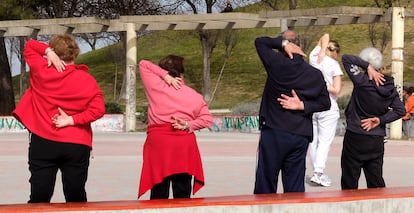How 25 minutes of moderate exercise a week may help prevent cognitive decline
Performing the equivalent of four minutes of physical activity a day is a valid strategy to strengthen the brain

Doing 25 minutes of moderate exercise a week (the equivalent of less than four minutes per day) could be a valid strategy to strengthen the brain and help prevent cognitive decline. That is the conclusion of a recent study published in the Journal of Alzheimer’s Disease in which a brain MRI was performed on more than 10,000 healthy men and women between 18 and 97 years old. The researchers found that, regardless of age, those who exercised moderately for at least 25 minutes a week had larger brain volumes in areas related to thinking and memory that tend to lose volume as we age.
“The process of age-related brain volume loss appears to be relatively unique to humans. It is estimated that it begins with a volume loss of 0.2% per year after a person turns 30 and increases to 0.5% per year by age 60, reaching up to 4% per year in Alzheimer’s. With age-related loss of brain volume comes a loss of cognitive efficiency. Taking into account that we do not have drugs to prevent this deterioration, the results of this study are important,” explains Cyrus A. Raji, teacher at the Washington University School of Medicine in St. Louis, the main author of the study. Raji describes the data as “surprising,” due to the low threshold of physical activity that is necessary to achieve a beneficial impact on brain health: “Current public health recommendations suggested 150 minutes of moderate physical activity per week; however, our study is encouraging because lower thresholds of physical activity, which are easier for more people to achieve, may still carry potential benefits for brain health.”
For Jesús Porta Etessam, president of the Spanish Society of Neurology (SEN), the data from this study “reinforces all previous findings and all hypotheses that state that moderate and sustained physical exercise can prevent cognitive deterioration.” The neurologist believes that the increase in brain volume associated with physical exercise could be due to a greater number of synaptogenesis: “Something important about this study is that it does not show that the participants who exercise remain the same while in the rest the brain atrophies, but that in the former the brain volume actually increases,” he adds.
Juan Domingo Gispert, head of the Neuroimaging Group at the Barcelonaβeta Brain Research Center (BBRC) of the Pasqual Maragall Foundation, points out that the research data “is plausible,” but believes that this type of association studies are subject to multiple interpretations. “One may think that exercise causes greater brain volume, but you could also think the opposite: that doing physical exercise is easier for those who have a better preserved brain, as they are in better health. Then the direction of causality would be the opposite. The most robust conclusions are obtained from clinical trials, of which approximately a dozen have been published.” One of them was carried out in 2021 by researchers from the Institute of Neurosciences of the University of Barcelona and published in Frontiers in Aging Neuroscience. In this case, the conclusion was the same: “Our results show that exercise is a promising approach for influencing inflammation and brain volume.”
Physical exercise and Alzheimer’s
“While we wait for lecanemab and donanemab [to become available], the first drugs that have shown some effectiveness in modifying the progression of Alzheimer’s, there is no medication that prevents mild cognitive impairment in patients. But we do have measures that can delay this cognitive deterioration that is associated with a neurodegenerative disease, and one of them, along with the Mediterranean diet, an active social life or mental health care, is moderate and continuous physical exercise. So, if we are told that 25 minutes a week can increase brain volume and, therefore, theoretically reduce the future risk of cognitive decline, it costs nothing to climb four flights to the office or walk instead of taking a taxi,” says Porta Etessam.
Could physical exercise then serve a kind of preventive medicine against Alzheimer’s? “The fact that, according to our research, the improved regions include those that are important for the development of the disease, suggests that physical activity may be an important way to maintain brain health and reduce the risk of memory loss in the future,” replies Raji. An opinion, however, not entirely shared by Gispert, who has no doubts regarding the impact of exercise at a cardiovascular level, but is not so sure about the more molecular, specific level of Alzheimer’s.
“Physical exercise is recognized as a protective factor against dementia, but what is not very clear is what the mechanism is. Surely this has more to do with an improved cardiovascular health. The most prevalent dementia is Alzheimer’s, and the risk factors that prevent up to a third of cases are, for the most part, of cardiovascular origin (such as hypertension, hypercholesterolemia and a sedentary lifestyle),” says the spokesperson for the BBRC. In fact, a recent study published in The Lancet Healthy Longevity by researchers from the Spanish National Center for Cardiovascular Research (CNIC) and headed by Gispert himself, has just shown that in addition to being the main cause of cardiovascular disease, atherosclerosis (the accumulation of fatty deposits in the arteries) is also involved in the brain alterations typical of patients with Alzheimer’s, which could mean that asymptomatic people with atherosclerosis would be more vulnerable to the effects of this disease.
Gispert points out that Alzheimer’s is characterized by the accumulation of the tau protein and the amyloid beta peptide 42 in the brain. In 2023, a group of Spanish researchers published a systematic review of studies delving into the relationship between physical exercise and amyloid beta protein. The result? Physical performance was not associated with amyloid beta accumulation in the brain or the blood. “There is no conclusive data; it would be plausible to think that physical exercise can work at a very early stage of the disease, helping to prevent amyloid from accumulating in the brain (this happens up to 20 years before symptoms appear). There, when the protein begins to accumulate, is surely when physical exercise can have a greater impact on that accumulation,” concludes Gispert.
Sign up for our weekly newsletter to get more English-language news coverage from EL PAÍS USA Edition
Tu suscripción se está usando en otro dispositivo
¿Quieres añadir otro usuario a tu suscripción?
Si continúas leyendo en este dispositivo, no se podrá leer en el otro.
FlechaTu suscripción se está usando en otro dispositivo y solo puedes acceder a EL PAÍS desde un dispositivo a la vez.
Si quieres compartir tu cuenta, cambia tu suscripción a la modalidad Premium, así podrás añadir otro usuario. Cada uno accederá con su propia cuenta de email, lo que os permitirá personalizar vuestra experiencia en EL PAÍS.
¿Tienes una suscripción de empresa? Accede aquí para contratar más cuentas.
En el caso de no saber quién está usando tu cuenta, te recomendamos cambiar tu contraseña aquí.
Si decides continuar compartiendo tu cuenta, este mensaje se mostrará en tu dispositivo y en el de la otra persona que está usando tu cuenta de forma indefinida, afectando a tu experiencia de lectura. Puedes consultar aquí los términos y condiciones de la suscripción digital.









































